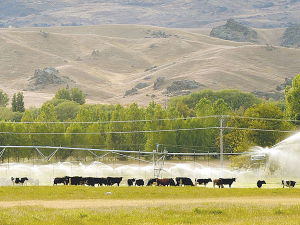Replacing farms with forests?
A horror story - that’s how Federated Farmers describes new research looking at forestry conversions’ impact on water quality.
 A new report on regenerative agriculture in New Zealand says it might benefit some regions more than others.
A new report on regenerative agriculture in New Zealand says it might benefit some regions more than others.
Research on regenerative agriculture in New Zealand might benefit some regions more than others, claims a new report.
The report, entitled ‘Place-based approaches to assessing the impact of regenerative agriculture in New Zealand’ looked at four case studies across the country where regenerative farming principles have the potential to address problems faced by farming communities.
“Research to test the possible benefits of ‘regenerative’ practices could have higher impact in parts of New Zealand where there are region-specific issues or opportunities. The knowledge we gain from doing research in those regions will be of wide benefit to all of New Zealand,” says lead author of the report, Dr Fiona Curran-Cournane, principal scientist at the Ministry for the Environment.
In Otago and Southland, the report describes regenerative agriculture techniques that could help address surface erosion caused by winter-forage cropping. It describes proactive approaches that may help retain ground cover and soil cohesion following grazing. Specific examples of regenerative techniques described in the report include ‘bale grazing’ and deferred grazing’.
In Tairāwhiti and Hawke’s Bay, some regenerative agriculture practices are identified that may support adaptation to predicted increases in the frequency and severity of drought and intense rain events under climate change. Practices identified in the report include ‘long residual’ grazing, adding pasture species with a diversity of root systems and height, and allowing pastures to grow taller.
“The report found regenerative agriculture techniques have the potential to adapt to and mitigate a range of issues facing the North Island’s upper east coast related to climate heating,” says one of the report authors, Dr Charles Merfield of the BHU Future Farming Centre at Lincoln University.
In Pukekohe, the South Auckland area that contributes over 20% of New Zealand’s vegetable production, the report highlights the potential for regenerative agriculture practices to address the very low soil carbon levels and excessive fertiliser application rates associated with intensive conventional outdoor vegetable production. Such practices include the use of cover crops, minimal tillage, and reductions in synthetic fertiliser application rates (e.g. via regular soil testing to ensure targeted fertiliser use and avoid excess nutrient loss).
Although these practices are not specific to regenerative agriculture, there could be high impact through encouraging a mindset of continuous farm improvement, a key principle of regenerative agriculture. Scientific evidence for any benefits of regenerative agriculture could also encourage uptake of these practices.
In the upper Waikato, a key issue is the need to mitigate the impact of land use on water quality in the Waikato River. Regenerative agriculture is resonating strongly for iwi and Māori landowners within and around the Ruahuwai takiwā, says Mike Taitoko, a specialist in Māori and indigenous economic development.
“Based on current regenerative agriculture initiatives and planning processes, these groups are increasingly strengthening their culture and connection to their land and rivers,” says Taitoko.
The report is one of four new reports that consider how to monitor and measure benefits to New Zealand from regenerative agriculture, particularly in response to region-specific issues and opportunities.
The reports were produced by a research project funded by the Our Land and Water National Science Challenge, the NEXT Foundation and Manaaki Whenua – Landcare Research.
The project has so far produced 19 reports, each providing recommendations for how claims regarding specific possible benefits of regenerative agriculture could be tested in New Zealand.
The sale of Fonterra’s global consumer and related businesses is expected to be completed within two months.
Fonterra is boosting its butter production capacity to meet growing demand.
For the most part, dairy farmers in the Waikato, Bay of Plenty, Tairawhiti and the Manawatu appear to have not been too badly affected by recent storms across the upper North Island.
South Island dairy production is up on last year despite an unusually wet, dull and stormy summer, says DairyNZ lower South Island regional manager Jared Stockman.
Following a side-by-side rolling into a gully, Safer Farms has issued a new Safety Alert.
Coming in at a year-end total at 3088 units, a rise of around 10% over the 2806 total for 2024, the signs are that the New Zealand farm machinery industry is turning the corner after a difficult couple of years.

OPINION: Meanwhile, red blooded Northland politician Matua Shane Jones has provided one of the most telling quotes of the year…
OPINION: This old mutt has been around for a few years now and it seems these ‘once in 100-year’ weather…